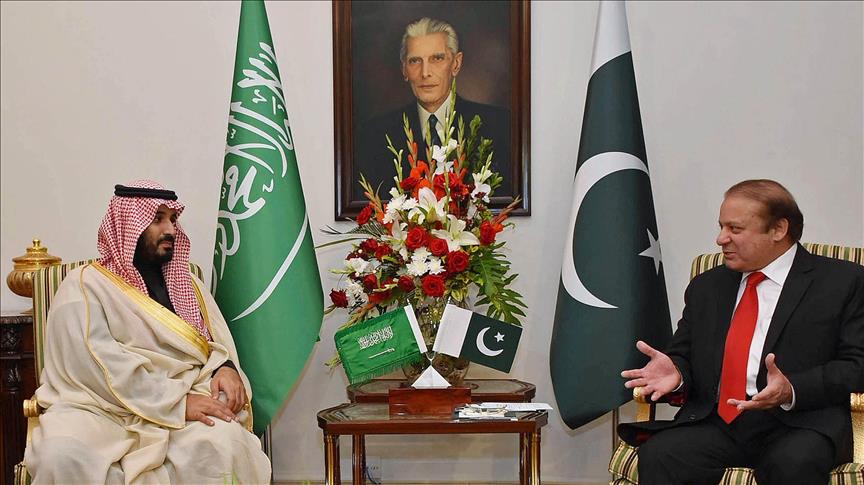Riyadh fails to draw Pakistan into row with Tehran
Saudi Arabia sends two high-profile officials to Islamabad in hopes of garnering Pakistani support against Shia Iran
 ISLAMABAD, PAKISTAN - JANUARY 10: Saudi Arabia's Defense Minister Mohammad Bin Salman Al Saud (L) meets Pakistani Prime Minister Nawaz Sharif (R) at the Prime Ministry Office in Islamabad, Pakistan on January 10, 2016. ( AA - Pakistan Prime Ministry Press Office)
ISLAMABAD, PAKISTAN - JANUARY 10: Saudi Arabia's Defense Minister Mohammad Bin Salman Al Saud (L) meets Pakistani Prime Minister Nawaz Sharif (R) at the Prime Ministry Office in Islamabad, Pakistan on January 10, 2016. ( AA - Pakistan Prime Ministry Press Office)
KARACHI, Pakistan
Mohammad bin Salman, deputy crown prince of Saudi Arabia, arrived in Islamabad on Sunday to seek Pakistan's support in its ongoing diplomatic spat with Iran.
He was the second high-profile Saudi visitor in less than three days: earlier this week, Saudi Foreign Minister Adel bin Al-Jubeir met with Prime Minister Nawaz Sharif and other Pakistani officials in an attempt to garner Islamabad's backing against Tehran.
Upon his arrival, Bin Salman -- who also holds the post of Saudi deputy prime minister and defense minister -- held a 90-minute meeting with Pakistan's powerful army chief, Gen. Raheel Sharif, after which he met with the prime minister.
According to Pakistani officials, however, the whirlwind meetings failed to convince Islamabad to change its neutral stance in the ongoing row between the two regional giants.
"Our policy is clear. We will stay neutral in the heightening tension between the two Muslim states," a senior foreign ministry official, who insisted on anonymity, told Anadolu Agency.
"Although we condemn Iranian interference in the internal affairs of Saudi Arabia, including its reaction to Sheikh [Nimr Baqir] al-Nimr's execution, still we will not be part of any military offensive against any country in the region," the official said.
The execution last week by the Saudi authorities of prominent Shia cleric Nimr Baqir al-Nimr sent shockwaves across the region and has since led to the rupturing of Saudi-Iranian diplomatic relations.
In addition, Riyadh -- a key defense and economic partner of Islamabad -- has long been calling for Pakistani support in its ongoing military campaign against Iranian-backed Shia Houthi rebels in Yemen.
Pakistan, however, has declined to comply, saying it prefers to safeguard its own regional interests and focus on its own military campaign against the ongoing Taliban insurgency.
Pakistani Foreign Affairs Adviser Sartaj Aziz, for his part, has offered to play a "mediatory role" between Riyadh and Tehran at an "appropriate time".
While Pakistan supports a 34-nation Saudi-led "anti-terrorism" alliance, it has said its participation would be restricted to intelligence-sharing and research.
Local analysts, for their part, see Islamabad's policy of neutrality on the simmering Iran-Saudi crisis as the "best option".
"This is the best option in light of the circumstances," Islamabad-based political analyst Atif Manzoor Butt told Anadolu Agency.
"Unlike Saudi Arabia or Iran, Pakistan isn’t an overwhelmingly Sunni or Shia country," he said. "Pakistan is home to both Sunnis and Shias and therefore can’t be a party to sect-based alliances."
Anadolu Agency website contains only a portion of the news stories offered to subscribers in the AA News Broadcasting System (HAS), and in summarized form. Please contact us for subscription options.







